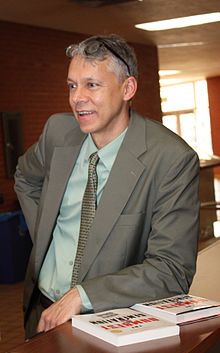Mark Bauerlein
Mark Bauerlein | |
|---|---|
 Bauerlein in 2011 | |
| Born | 1959 |
| Alma mater | University of California, Los Angeles |
| Occupation | Academic |
| Employer | Emory University |

Mark Weightman Bauerlein (born 1959) is an English professor emeritus at Emory University and a senior editor of First Things.[1] He also serves as a visitor of Ralston College, a start-up liberal arts college in Savannah.[2]
Early life and education
Bauerlein earned his doctorate in English from UCLA in 1988, having completed a thesis on poet Walt Whitman under the supervision of Joseph N. Riddel.[3]
Career
Bauerlein is a Professor Emeritus of English who taught at Emory University from 1989 to 2018,[4] with a brief break between 2003 and 2005 to work at the National Endowment for the Arts, serving as the director of the Office of Research and Analysis.[5][6] While there, Bauerlein contributed to an NEA study, "Reading at Risk: A Survey of Literary Reading in America".[7] In 2023, he was appointed by Ron DeSantis to the New College of Florida Board of Trustees.
Beliefs concerning DEI in colleges
Bauerlein has said he strongly opposes implementing diversity, equity, and inclusion (DEI) in colleges.
“I urge, and I’ve written this, that all DEI initiatives be eliminated from higher education, that DEI offices be absolutely closed, shut down,” Bauerlein said. “They lead students to develop bad ideas.”
According to Bauerlein, when DEI is incorporated into academia, the peer review process becomes corrupted.
“When you start saying, ‘Oh, we need to publish more writers who are not white men,’ the process has been corrupted,” Bauerlein said. “Right off the bat, standards go down. Peer review becomes politicized. This is the beginning of the fall of a discipline, and I’ve seen it happen many, many times.”[8]
Published works
Bauerlein's books include Literary Criticism: An Autopsy (1997) and The Pragmatic Mind: Explorations in the Psychology of Belief (1997). He is also the author of the 2008 book The Dumbest Generation: How the Digital Age Stupefies Young Americans and Jeopardizes Our Future (Or, Don't Trust Anyone Under 30),[9][10] which won the Nautilus Award.[11]
Bauerlein explains how his experience as a teacher led to his writing of The Dumbest Generation:
Because in my limited experience as a teacher, I’ve noticed in the last 10 years that students are no less intelligent, no less ambitious but there are two big differences: Reading habits have slipped, along with general knowledge. You can quote me on this: You guys don’t know anything.[12]
Apart from his scholarly work, he publishes in popular publications such as The Federalist, Chronicle of Higher Education, The Washington Post, The Wall Street Journal, The Weekly Standard and The Times Literary Supplement.[3]
In 2022, Bauerlein published a sequel to The Dumbest Generation titled The Dumbest Generation Grows Up: From Stupefied Youth To Dangerous Adults.[13]
Personal life
In 2012, Bauerlein announced his conversion to Catholicism.[14] He has described himself as an "educational conservative,” while he socially and politically identifies as being "pretty ... libertarian", according to an interview conducted by Reason magazine.[15] He endorsed Donald Trump in the 2016 U.S. presidential election.[16] Bauerlein has an identical twin brother.[14]
List of works
- Bauerlein, Mark (1991), Whitman and the American Idiom, Louisiana State University Press.
- ——— (1997), Literary Criticism, An Autopsy, University of Pennsylvania Press.
- ——— (1997), Pragmatic Mind: Explorations in the Psychology of Belief, Duke University Press.
- ——— (2001), Negrophobia: A Race Riot in Atlanta, 1906, Encounter Books.
- ——— (2008), The Dumbest Generation: How the Digital Age Stupefies Young Americans and Jeopardizes Our Future (Or, Don't Trust Anyone Under 30), New York, NY, USA: Jeremy P. Tarcher/Penguin
- ——— (2022), The Dumbest Generation Grows Up: From Stupefied Youth to Dangerous Adults, New York, NY, USA: Simon and Schuster
See also
References
- ^ "Featured Authors". 21 September 2023.
- ^ "About Ralston College". Ralston College. Retrieved 9 August 2013.
- ^ a b "Mark Bauerlein, Professor". english.emory.edu. Archived from the original on 2019-03-26.
- ^ Zhu, Ashley (2023-01-19). "DeSantis appoints former Emory professor to New College of Florida Board of Trustees". The Emory Wheel. Retrieved 2023-02-02.
- ^ "Bauerlein", Faculty, Emory, archived from the original on 2009-12-08, retrieved 2009-12-12.
- ^ Biography (online ed.), National Review, archived from the original on February 23, 2009, retrieved April 26, 2010
- ^ Reading at Risk (PDF), NEA, archived from the original (PDF) on 2008-04-20.
- ^ Zhu, Ashley (2023-01-19). "DeSantis appoints former Emory professor to New College of Florida Board of Trustees". The Emory Wheel. Retrieved 2023-02-02.
- ^ Bauerlein 2008.
- ^ Catalog record for The Dumbest Generation at the United States Library of Congress
- ^ "The Dumbest Generation by Mark Bauerlein: 9781585427123 | PenguinRandomHouse.com: Books". PenguinRandomhouse.com. Retrieved 2022-07-16.
- ^ Betts, Eric (29 February 2008), "Are We The Dumbest Generation?", The Emory Wheel, archived from the original on 2011-09-28.
- ^ Bauerlein, Mark (February 2022). The Dumbest Generation Grows up. ISBN 9781684512201.
- ^ a b Bauerlein, Mark (May 2012) My failed atheism, First Things Journal Retrieved October 23, 2014
- ^ Hayes, Dan (21 July 2008). "Mark Bauerlein: Why Young Americans Are the Dumbest Generation". Reason. Retrieved 9 August 2013.
- ^ "Scholars and Writers for America". scholarsandwritersforamerica.org. Archived from the original on 5 October 2016. Retrieved October 1, 2016.
External links
- "Bauerlein", Faculty, Emory, archived from the original on 2009-12-08.
- "Transcript of a conversation with readers", The Boston Globe, May 14, 2008.
- Bauerlein, Mark (2005–2006). "Posts". The Valve, A Literary Organ. Archived from the original on 2011-02-02.
- A film clip The Open Mind — "The Dumbest Generation" (2008) is available for viewing at the Internet Archive
- Bauerlein, Mark; Feldman, David (Sep 28, 2008), debate with a recent Emory Goizueta Business School Graduate, CNN.
- Appearances on C-SPAN
